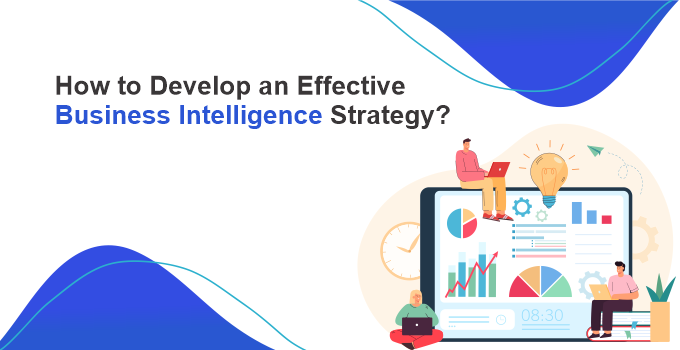How to Develop an Effective Business Intelligence Strategy?
- Business Intelligence Strategy
- Steps To Come Up With a Business Intelligence Strategy
- 1.Understand the Background
- 2.Budget and Planning
- 3.Select a BI vendor
- 4.Implement a BI Environment that can Scale
- 5.Create Effective Reporting and Metrics
- 6.Get Support from Management
- 7.Appropriate Security Precautions
- What Happens When You Fail To Implement An Effective Business Intelligence Strategy?
- It’s Time To Implement Business Intelligence Strategy
Business intelligence is an umbrella term for a large number of technologies. These technologies are put in place to collect, analyze and distribute information to all the right people across all departments inside a business. A well-known 2020 survey says that 52% of companies lack a formal strategy for collecting insights from their data. With so much vital information at their fingertips, they’re missing out on enough sales opportunities to leave you stunned. This means there’s more than enough room for businesses to develop more business intelligence strategies.
Business Intelligence Strategy
A Business Intelligence Strategy is a methodical, systematic way of gathering, analyzing, and presenting information to management to influence decisions that will directly and predictably impact a company’s bottom line. By collecting and analyzing data, you can make better business decisions. To get satisfactory results, you need a strategy that is implemented with the help of carefully selected web applications and computer software.
Developing business intelligence strategies is a rewarding investment that will help you plan and acquires actionable insights. So the whole process of making a business intelligence strategy is based on three things:
- Understanding your needs
- Planning how to meet those needs
- Putting that plan into action
Steps To Come Up With a Business Intelligence Strategy
It’s important to make sure your BI strategy supports your business goals. You can do this by setting a vision for your organization and going from there. This initiative will put information into the hands of employees that will help them make better decisions. If you’re ready to begin your transformation, you can start by following our Blueprint.
Click here to read: Implementing AWS Monitoring for Efficient Cloud Management
1.Understand the Background
Businesses often get tied up in legal issues or complex financial reports that aren’t meaningful to the bottom line. Business intelligence professionals can help manage a business effectively by understanding its background, goals, and operations. To establish a business intelligence strategy, you have to define your goals.
- What are your immediate and mid-range goals?
- What is your plan to gain an understanding of your target group?
It is vital to have a clear picture of where you want to go as a company so that you can make an effective plan and execute it effectively. A good business intelligence strategy will help you outline the steps for your company to reach its goals. This framework is based on years of analyzing the behavior of companies who have adopted good business practices, both online and off. By understanding your background you’ll be able to spot opportunities to improve your own company and also see what other trends are emerging in your industry.
2.Budget and Planning
Business strategy is all about determining how your business will grow and create economic value for your shareholders. This means analyzing economic conditions at home and around the world, determining trends and opportunities, and designing a growth strategy that optimizes a company’s performance.
A solid business intelligence strategy begins with an understanding of your budget. Your budget should reflect where you spend your time, what products and services are most important to you, and what activities take up the most of your time and attention. You can use the list of activities to create a measure of progress toward your goal. For example, if you want to grow your business significantly, it will be important that you spend more time focusing on marketing than on recruiting employees.
3.Select a BI vendor
Select a business intelligence vendor is essential to aid in the development of a strategy for your business. One of the first steps to creating a proper strategic plan is to find out what sort of services is available within the country and whether they are suitable for your needs.
There are many options to choose from, but there are a select few that specialize in helping small businesses maximize their return on sales and investments. The benefit of using a BI vendor for your small business is cost savings, increased productivity, and increased market share. Business Intelligence (BI) is an umbrella term that refers to the collection, analysis, and sharing of data from various sources.
They will be able to provide you with reports and analyses that will enable you to make better business decisions. At the same time, they will be able to cut costs for your business by providing you with insights that can be utilized to make your data management systems more effective.
- Select vendors based on your required functionalities
- Budget is also important to select the right BI vendor/software
- Technology Strength of Vendor must be good
- Last but not least is consulting capability
Click here to read: 5 Steps To Protect Your Business From Supply Chain Disruption
4.Implement a BI Environment that can Scale
Business intelligence is about collecting and analyzing data to support your business decisions. Organizations must constantly evolve their strategies, communications, tools, people, and IT to operate effectively with current or potential threats. Potential threats are growing more sophisticated, and businesses must grow more sophisticated in their responses. Information is only as valuable as how it is used.
It is vital to leverage the best resources available to you to ensure your survival, while also becoming a more efficient, effective business. Recent technological advancements have enabled companies to implement business intelligence solutions at an increased scale. Big data and analytics enable companies to make better, faster decisions which enable them to compete with better businesses in a more fluid marketplace.
5.Create Effective Reporting and Metrics
It is essential to create effective reporting and metrics for your business intelligence projects. This step follows from the creation of the preliminary strategic plan and will typically include planning for the initial execution of suggested strategies (and related data), and running any necessary analysis to inform decisions about how and when to implement proposed strategies. The creation and review of recommended reports are an integral part of business intelligence strategy.
For those who are willing to put in the time, it is possible to create effective analytics but won’t happen if you don’t have an understanding of what the report will look like and how it will be used by your team.
6.Get Support from Management
Business Intelligence gives managers the ability to see trends, determine new opportunities, and act on prior knowledge. It helps accountants create sound financial estimates, tax attorneys prepare tax returns, and IT professionals maintain systems to keep the business running efficiently. If you are making a business decision for the benefit of your business rather than doing it simply for your self-interest, then you must get the support you need from management. The sooner you recognize that this is necessary, the sooner you can get the support you need to make the right decision for your business rather than allow it to be taken from you through selfishness or fear.
Click here to read: 3 Biggest International E-Commerce Challenges and How to Overcome Them
7.Appropriate Security Precautions
Security is an integral part of any information security plan. Regardless of how sophisticated your corporate network is, unauthorized access to company data can result in financial losses, lawsuits, and legal consequences. Information security is a concern for all companies regardless of size or industry. Therefore, you must develop a comprehensive information security plan that incorporates the elements of data privacy, risk management, and employee access controls into a well-rounded approach. By ensuring proper security measures are in place, you can reduce the chances of a data breach affecting your organization and the millions of personal information exposed.
What Happens When You Fail To Implement An Effective Business Intelligence Strategy?
Failure is inevitable in any endeavor, including business. Implementing a bad strategy or ignoring opportunities to improve your position can fail. But most people fail because it is difficult to find a solution that works. When you start looking for business intelligence solutions, take a look at what other people are doing and learn from their successes. Then imitate them. In this way, you’ll be doing yourself a great favor by avoiding the common pitfalls of getting started in business intelligence.
It’s Time To Implement Business Intelligence Strategy
Business intelligence strategy is all about taking an interdisciplinary approach to problem-solving. It involves working with many people across many disciplines, from operations and finance to data science and creative writing. By implementing BIS into your business from the day you start and continuing throughout each phase of growth, you will raise your odds of success and increase the quality of results obtained.



